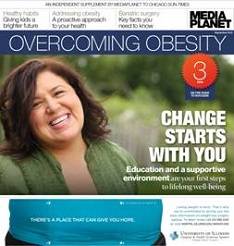Inertia â The Real Weight Loss Killer
By: Warren Huberman, Ph.D.We do what we do because thatâs what we do. That may seem like one of the most ridiculous sentences ever committed to paper, but read it again. We do what we do because thatâs what we do.
This means that we donât necessarily do what we do because we made conscious choices to do it that way. It means that much of our behavior is on autopilot. Think of this phrase with regards to eating. We spend so much time talking about emotional eating that weâve forgotten that most of the time that weâre eating unhealthy or eating âcomfort foodsâ it is not because we are depressed or anxious, itâs because weâre just not thinking about what we are doing, and eating has become a seemingly automatic behavior. Our minds are somewhere else. Iâm not saying that emotional eating isnât a problem, but rather that the behavior of eating without thinking is as big if not the bigger problem much of the time. Think about it. How often do you go into the kitchen to have some cookies because you are depressed? Now, think about how many times you go into the kitchen to get some cookies and you have no idea why you went into the kitchen. I bet the latter situation happens much more often. Ever find yourself in the middle of eating some cookies and you donât even remember going into the kitchen or opening up the box of cookies? See what I mean!!!
It may be true that we learned to eat as a means of comforting ourselves from negative emotions such as anxiety and depression. However, the behavior of eating often persists long after the anxiety and depression is gone. Why? Habits are really hard to break and your brain isnât in the business of breaking them without a whole lot of effort. A great deal of any individualâs behavior occurs outside of his or her awareness and with very little conscious thought. What this means is that many of our bad habits persist because we are not aware enough to do anything about it. We donât necessarily reach for the cookies because we CHOOSE to have cookies. Our brains just automatically crave cookies when we are in circumstances that we have commonly eaten cookies in the past. We donât even need to think about it anymore. Because youâve engaged in the behavior of eating cookies under specific circumstances so many times (letâs say at night, feeling tired, watching television, a bit bored with the show) your brain now cues you to go for cookies without any conscious thought from you. No thinking required! And if youâre not actively thinking about your choices, youâre not making a choice. Youâre operating on inertia.
What is inertia? You remember that phrase from high school physics⊠âan object in motion is likely to stay in motionâŠ.â What this means in terms of behavior is that a behavior that is repeated over and over (also called a habit) will persist unless something comes along to interfere with that behavior. Inertia is when behavior just keeps going because its been going. John Lennon had this wonderful lyric that said âlife is what happens to you while youâre busy making other plans.â This means that as long as you are alive, even when youâre not trying to make decisions or to make change, life goes on. Therefore, if you donât do something to make changes in your behavior, youâll likely keep performing the same behaviors youâve always performed under similar circumstances. This is exactly what happens with eating most of the time. Diets are an exception. Consider just how different your eating behavior is from its normal state when youâre on a diet.
When youâre on a diet, you are contemplating every decision. You are in the moment and you are making choices. You are reading labels. You are measuring servings. You are counting calories, points, carbohydrates, etc. You are âon.â When you go off the diet, if youâre like most people, ALL of this stops. No more thinking, no more measuring, no more counting, no more making choicesâŠjust running on inertia. Eating with very little thought and your brain seems to eagerly resort back to its old ways. Thatâs inertia.
The keys to change are therefore rather obvious. Be in the moment. Contemplate as many food decisions as you can. Plan your meals and snacks ahead of time rather than trusting that your brain will help you make the right decision in the moment. It wonât. Anticipate high-risk eating situations like parties, weddings, and barbeques. Maybe youâve heard all of this before. You probably have. There are many different terms used for this approach and they are likely speaking to the same concept. A hot term these days is âmindfulness.â Itâs not really a new conceptâŠthe Buddhists have been talking about it for several thousand years. Itâs really very simple in theoryâŠbe aware and observe your thoughts and feelings, and be present in the here-and-now. Then make your decision.
Why is mindfulness so important? Because habits and the power of inertia are incredibly powerful and the weight you have lost or are trying to lose wants to come back. Your body isnât the least bit interested in helping you lose weight. So if your mind isnât very conscious of what itâs trying to achieve, itâs just not going to happen. In fact, your body is fighting tooth-and-nail against you. Inertia is what happens when youâre not fighting back. RememberâŠwe do what we do because thatâs what we do. If you want to lose weight and keep it off, your new phrase needs to become âI do what I do because thatâs what Iâve decided to do,â or better stated, âI eat what I eat because that is what I choose to eat.â
Dr. Huberman is a Clinical Psychologist with a practice in New York City. He is a Clinical Instructor in the Department of Psychiatry at the NYU School of Medicine. He is an Affiliate Psychologist at the NYU Langone Medical Center and NSLIJ-Lenox Hill Hospital. Dr. Huberman is a consulting psychologist to the NYU/Langone Weight Management Program. He is the author of the New Book Through Thick & Thin: The Emotional Journey of Weight Loss Surgery. For more information, visit warrenhuberman.com.



















